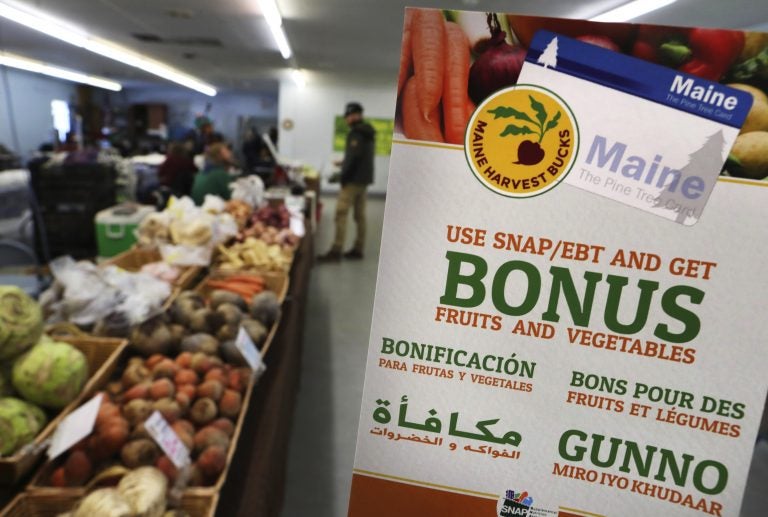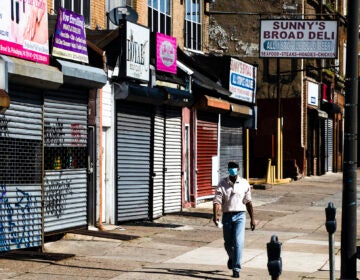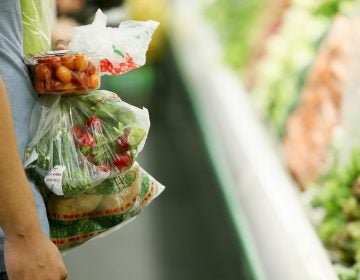Pa. coronavirus update: DHS Secretary urges those in need to apply for benefits
Congress has expanded eligibility for SNAP, Secretary Miller urges Pennsylvanians to apply.

In this Friday, March 17, 2017, file photo, a sign advertises a program that allows food stamp recipients to use their EBT cards to shop at a farmer's market. (Robert F. Bukaty/AP Photo)
Ask us about COVID-19: What questions do you have about the current surge?
DHS Secretary Teresa Miller says ‘help is available’
Enrollment in SNAP and Medicaid benefits in Pennsylvania has increased overall during the COVID-19 pandemic, though it has dropped slightly since May.
As congress expands eligibility for help during the pandemic, Teresa Miller, Secretary of the state’s Department of Human Services, said she hopes more families and individuals will get the assistance they need.
“SNAP exists so you don’t have to worry about where your next meal will come from. Medicaid and CHIP exist so you and your children don’t have to forgo healthcare coverage, particularly in the middle of a pandemic,” she said.
“Our public assistance network exists to help people during times like what we’re currently facing. They can be a lifeline that make people make sure they can go to the doctor, have enough to eat or pay utilities as other bills and needs arise. No one should feel they have to endure this period, and its stress, anxiety and uncertainty, alone.”
Since March, Medicaid enrollment increased by 300,076 people, a 10.6% increase. December data has yet to be published. SNAP enrollment increased by more than 96,549 people since February, which is a 5.6% increase.
Overall, SNAP benefits enrollment has decreased slightly since a peak in May. Miller said this is likely due to federal pandemic unemployment compensation, which was being counted as income on peoples’ SNAP application.
However, under the Consolidated Appropriations Act of 2021, signed into law last month, federal pandemic unemployment compensation will no longer be counted as income for those applying for SNAP.
Congress has also temporarily increased the SNAP maximum benefit allotment by 15% for the period between Jan. 1 and June 30. This means a family of four can receive a maximum allotment of $782, which is up from $680.
“This is going to be incredibly helpful for our lowest income individuals and families as additional SNAP benefits will provide them with added food security,” Miller said.
“Until this change, those receiving the maximum SNAP benefits did not see an increase in their benefits during the pandemic and this economic downturn. This not only hurt our lowest income neighbors, but also our communities as our charitable food networks were overburdened. So we’re thankful for this rule change, but there’s more that can be done as well.”
Miller said she hopes the new allotment and increase in benefits will take the pressure off food banks.
“Given we’re in a pandemic, the more we can increase these benefits and the more support we can give families, frankly, the lighter the load we’re going to see on the charitable food network because If you talk to any of our charitable food network partners they will tell you this pandemic has significantly increased the burden on them to feed families.”
Pennsylvanians can apply for assistance here.
 WHYY is one of over 20 news organizations producing Broke in Philly, a collaborative reporting project on solutions to poverty and the city’s push towards economic justice. Follow us at @BrokeInPhilly.
WHYY is one of over 20 news organizations producing Broke in Philly, a collaborative reporting project on solutions to poverty and the city’s push towards economic justice. Follow us at @BrokeInPhilly.

Get daily updates from WHYY News!
WHYY is your source for fact-based, in-depth journalism and information. As a nonprofit organization, we rely on financial support from readers like you. Please give today.




![CoronavirusPandemic_1024x512[1]](https://whyy.org/wp-content/uploads/2020/03/CoronavirusPandemic_1024x5121-300x150.jpg)


